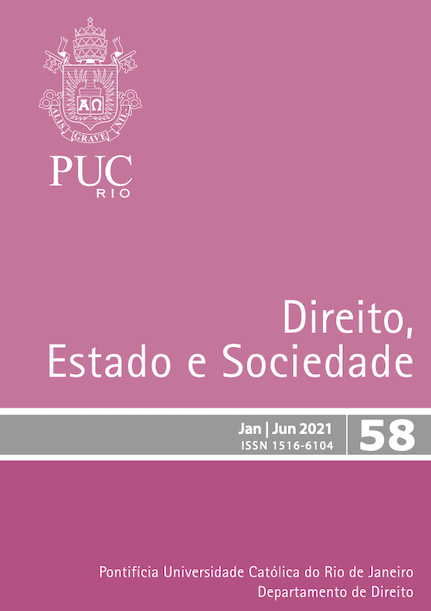A Teoria de Justiça global como alternativa à Teoria de Justiça rawlsiana em contextos de dominação múltipla
DOI:
https://doi.org/10.17808/des.58.1152Palavras-chave:
Teorias de justiça. Justiça global. Geopolítica da pobreza. Desigualdade.Resumo
No contexto multifacetado atual, há atores que se beneficiam do design estrutural mundial ao mesmo passo em que a diversos outros são impostas barreiras que dificultam o acesso às riquezas - as quais, defende-se, em havendo uma arquitetura distribucional global voltada à equidade, poderiam ser melhor alocadas, de maneira a beneficiar um maior número de indivíduos. Nesse passo, o presente artigo, utilizando-se, principalmente, de método de pesquisa bibliográfico, possui o objetivo de demonstrar que a visão rawlsiana, ainda que cabível em sociedades herméticas, é inadequada para um mundo submerso em desigualdades econômicas altamente maculadas pela forma de acumulação histórica, predatória e usurpadora, imposta pelos países mais desenvolvidos economicamente em relação aos pobres globais. Assim, busca demonstrar, por uma análise de conjunto e com referência na teoria de justiça global consoante avançada por Thomas Pogge, a maneira pela qual a estruturação global ainda hoje prejudica, seletivamente - i.e., principalmente por meio dos privilégios internacionais sobre recursos e sobre empréstimos -, países, mantendo-os - ou, mais frequentemente, suas populações - em condição de pobreza.Referências
APPIO, Eduardo. Apresentação. In: GARGARELLA, Roberto. As teorias da justiça depois de Rawls: um breve manual de filosofia política. São Paulo: WMF Martins Fontes, 2008.
BARRETTO, Vicente de Paulo; BRAGATO, Fernanda Frizzo. Leituras de filosofia do direito. Curitiba: Juruá, 2013.
BEITZ, Charles R. Political theory and international relations. Princeton: Princeton University Press, 1999.
BERNSTEIN, Alyssa R. Law of Peoples. In: CHATTERJEE, Deen K. (Org.). Encyclopedia of global justice. New York: Springer, 2011, pp. 635-639.
BROCK, Gillian. Global justice: a cosmopolitan account. Oxford: Oxford University Press, 2009.
BROCK, Gillian. Global justice. In: ZALTA, Edward. (Org.). Stanford encyclopedia of philosophy. Stanford, Mar. 06 2015. Disponível em: <http://plato.stanford.edu/entries/justice-global/>. Acesso em: 17 maio 2015.
BUCHANAN, Allen; GOLOVE, David. Philosophy of international law. In: COLEMAN, Jules; SHAPIRO, Scott. (Org.). The Oxford handbook of jurisprudence & philosophy of law. Oxford: Oxford University Press, 2004, pp. 868-934.
CHUNG, Young-Iob. South Korea in the fast lane: economic development and capital formation. Oxford, UK: Oxford University Press, 2007.
FANON, Frantz. Les damnés de la terre. Paris: La Découverte, 2002.
FORST, Rainer. Justice, morality and power in the global context. In: POGGE, Thomas. FOLLESDAL, Andreas. (Org.). Real world justice: grounds, principles, human rights and social institutions. Dordrecht: Springer, 2005, pp. 27-36.
FORST, Rainer. The right to justification: elements of a constructivism theory of justice. New York: Columbia University Press, 2012.
FRASER, Nancy. Escalas de justicia. Barcelona: Herder, 2008.
FRASER, Nancy. Scales of justice: reimagining political space in a globalizing world. New York: Columbia University Press, 2009.
HÖFFE, Otfried. La justicia en un mundo globalizado. Santiago: Escuela de Gobierno Universidad Adolfo Ibãnez, 2010.
HUMAN Rights Watch (HRW). Well oiled: oil and human rights in Equatorial Guinea. 2009. Disponível em: <http://tinyurl.com/j5gxbp9>. Acesso em: 25 jan. 2016.
JAGGAR, Alisson. (Ed.). Thomas Pogge and his critics. Cambridge, UK: Polity, 2010. 272 p.
KANT, Immanuel. À paz perpétua. Porto Alegre: L&PM, 2011.
KLEINGELD, Pauline; BROWN, Eric. Cosmopolitanism. In: ZALTA, Edward. (Org.). Stanford encyclopedia of philosophy. Stanford, Dec. 21 2019. Disponível em: <http://plato.stanford.edu/entries/cosmopolitanism/>. Acesso em: 03 set 2020.
LADWIG, Bernd. Global social justice: whose justice? Whose responsibility? In: MERLE, Jean-Christophe. (Org.). Spheres of global justice. Dordrecht: Springer, 2013, pp. 445-456.
LANDESMAN, Bruce M. Global justice. In: CHATTERJEE, Deen K. (Org.). Encyclopedia of Global Justice. New York: Springer, 2011, pp. 421-424.
MATTEI, Ugo; NADER, Laura. Plunder: when the rule of law is illegal. Malden, MA: Blackwell Publishing, 2008.
POGGE, Thomas. World poverty and human rights: cosmopolitan responsibilities and reforms. Cambridge: Polity, 2002.
POGGE, Thomas. "Assisting the global poor". In: CHATTERJEE, Deen K. The ethics of assistance: morality and the distant needy. Cambridge, UK: Cambridge University Press, 2004a. Disponível em: <http://tinyurl.com/zzsudzo>. Acesso em: 15 dez. 2017.
POGGE, Thomas. Real world justice. In: BROCK, Gillian; MOELLENDORF, Darrel. (Org.). Current debates on global justice. Dordrecht: Springer, 2005b, pp. 29-53.
POGGE, Thomas. Politics as usual: what lies behind the pro-poor rhetoric. Sttaford: Polity, 2010.
RAWLS, John. Uma teoria da justiça. São Paulo: Martins Fontes, 1997.
RAWLS, John. A theory of justice: revised edition. Cambridge, Mass.: The Belknap Press of Harvard University Press, 1999a.
RAWLS, John. Law of peoples and the idea of public reason revisited. Cambridge: Harvard University Press, 1999b.
RAWLS, John. O direito dos povos. São Paulo: Martins Fontes, 2001a.
SINGER, Peter. Famine, affluence, and morality. Philosophy and Public Affairs, [S.l.], v. 01, n. 1, pp. 229-243, 1972. Disponível em: <http://tinyurl.com/3nc66e>. Acesso em: 22 ago. 2020.
SUNDIATA, Ibrahim K. Equatorial Guinea: colonialism, state terror and the search for stability. Boulder: Westview Press, 1990.
SUPIOT, Alain. Homo Juridicus: ensaio sobre a função antropológica do Direito. São Paulo: WMF Martins Fontes, 2007.
Downloads
Publicado
Como Citar
Edição
Seção
Licença
Copyright (c) 2020 Revista Direito, Estado e Sociedade

Este trabalho está licenciado sob uma licença Creative Commons Attribution-NonCommercial-NoDerivatives 4.0 International License.
A submissão de artigos para publicação na Revista Direito, Estado e Sociedade implica a concordância dos autores com os seguintes termos:
1. O(s) autor(es) autoriza(m) a publicação do texto em número da Revista;
2. O(s) autor(es) asseguram que o texto submetido é original e inédito e que não está em processo de avaliação em outra(s) revista(s);
3. O(s) autor(es) assumem inteira responsabilidade pelas opiniões, ideias e conceitos sustentados nos textos;
4. O(s) autor(es) concedem aos editores o direito de realizar ajustes textuais e de adequação ao padrão de publicação da Revista;
5. Permite-se a reprodução total ou parcial dos trabalhos, desde que explicitamente citada a fonte.













